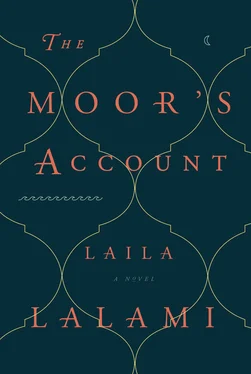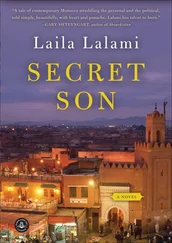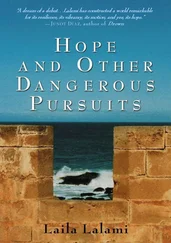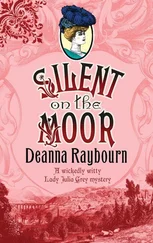But the second time she told me this story, it was many years later, when she had despaired of making me listen to reason, when she had lost hope that I would remain in Azemmur. She said I had been destined for a life of travel. But she could just as easily have prophesied that, having been born on the day my father stood up to the Portuguese soldiers, I had been destined for a life of war, or that, having endured a riot before my arrival, I had been destined for a life of survival, or that, having been born to a crippled father, I had been destined for a life of loss. If only I could see her now, I would tell her that all these destinies were mine in the end, and that God, in His bountiful mercy, had sent multiple signs, though in her desire to prepare herself and me for what was yet to come, she had noticed only two.
OF THE TEN YEARS that followed my birth, I can only say that they were happy, maybe even the happiest of my life. We lived with my uncle Abdullah and his family in an old house with whitewashed walls and a creaky blue door, down the street from the gates of the medina. The air inside smelled of bread and wood, and it was full of a constant, comforting noise — someone was always calling out for a child, or grinding herbs in the mortar, or running up the stairs in slippered feet, or sharing a story around the evening brazier. My uncle Abdullah was older than my father by five years, though he treated my father with the deference and respect due to an older sibling. My uncle Omar, the middle brother, had recently gained admission into the carpentry guild and lived with us, too, occupying one of the four rooms around the center courtyard. He had never married, a fact that filled both my mother and my aunt Aisha with disquiet. They often wondered out loud what was wrong with him, why he had not taken a wife. It was true that he had a lazy eye, but that alone, they said, could not account for his reluctance. Later they clucked and argued with each other about whose turn it was to wash his clothes, mend his jellabas, or serve his meals. And later yet they felt only relief, because his bachelorhood meant fewer mouths to feed.
After my father lost his left arm, he became known around town as Muhammad the Lame. You might think this was an impediment to his business, but the opposite was true: his nickname made it easier for him to stand out among all the other notaries and to be remembered whenever his services were needed. Do you need to record a deed? people said. Just go to Muhammad the Lame, he will take care of it. Or: If you wish to divorce that wife of yours, at least go to Muhammad the Lame, he will be discreet. Or: Talk to that shifty judge if you must, but make sure Muhammad the Lame is there to record what he said.
Over the years, my father gained a reputation as a reliable and faithful notary, whose demeanor mirrored the feelings most appropriate for the occasion — joy at a wedding, disappointment in a divorce, delight at a new sales contract, or sadness at the severing of a partnership. In this way, he came to know nearly everyone on our side of the medina, speaking with them on the most significant days of their lives and witnessing their most private emotions.
Sometimes, my father hired out his donkey to farmers or merchants in the area, either to supplement his earnings or to help out a friend. Other times, my mother found work as a bridal attendant at lavish weddings, but my father rarely let her because he disapproved of such ostentatious displays of joy. My parents were further blessed with the birth of three other healthy children — my sister, Zainab, and my twin brothers, Yahya and Yusuf. My uncle Abdullah, who had four daughters of his own, treated my brothers and me as the sons he never had. We were not rich but, as I said, we were happy.
When I turned seven, my father bought me a jellaba made from the finest wool in Azemmur, and took me to meet the fqih of our mosque. My father wanted me to learn how to read, memorize the Holy Qur’an, and later attend the Qarawiyin, in the hope that I might take up the same profession as him. Azemmur was a growing town, my beloved father reasoned, and a growing town required deeds and contracts, which he could easily and frequently imagine me drafting by the light of a candle. This image of me as a dutiful recorder of events in other people’s lives did not particularly inspire me. At the msid, I listened to the day’s lessons, but all too often I wondered why I was not allowed to go play on the street, like all the other children in the neighborhood.
My sense of this injustice was especially strong on Tuesday, which was market day, because the other boys were able to run around, exploring stalls, eating sweetmeats, watching a dancer or a snake charmer, or otherwise getting into mischief, while I had to sit in a dark, musty classroom with my fqih. Before long, I began to skip school in order to indulge in my favorite pastime — visiting the souq. There, I watched fortune-tellers, faith healers, herbalists, apothecaries, and beggars. They promised a healthy child, a painless life, a pliant husband, a dutiful wife, or a path to heaven, perhaps different versions of the same things, but the stories they told or foretold comforted people, inspired them, allowed them to imagine a future they had denied themselves.
One Tuesday, I noticed a new tent at the market. It was made of a ghostly black fabric and, unlike the other tents in its row, it was closed. Eager to satisfy my curiosity, I lifted a side flap and slipped inside without being seen. It took a moment for my eyes to adjust to the darkness and the suppressed heat. The rank odor of men’s sweat mixed with the smell of steaming tripe that drifted from the stall across the way. But, after a moment, I was able to make out two dozen spectators, men of different ages and stations, merchants in linen cloaks, farmers in patched jellabas, or Jews in customary black. They sat in a circle around a narrow cot, on which a man, naked save for his seroual, lay facedown. He looked asleep. Over him stood a tall and turbaned healer, with piercing eyes and large nostrils.
The healer spoke with a lilting voice and had an accent I was too young to place. This poor man, he said, suffers from constant pain in his shoulders and neck. By day, it torments him and prevents him from doing his work. By night, it tortures him and keeps him from sleep. Oh, what kind of a life is this? I ask you. How can a man endure so much grief? The elders teach us: if you are a peg, endure the knocking, but if you are a mallet, proceed with the strike. Today I will show you that you do not have to be a peg. I will begin by preparing this man for treatment.
He rubbed his hands together — I noticed that one of them had an additional finger, sprouting from the thumb — and ran them on the patient’s neck and shoulders, massaging them deeply for a few moments. Though I listened to him, I could not take my eyes off his extraneous finger. I wondered if it hurt him, if he used it for grabbing things, if it made it easier or harder for him to eat or to wash. And I suppose I also wondered why a healer could not find a way of curing himself before he attended to other people’s ailments.
Now the healer took a glass cup, turned it upside down, and placed a candle inside it until he was satisfied that the glass was hot. In the name of God, he whispered, and, in a swift motion, he removed the candle and placed the hot glass on the man’s back. The skin lifted inside the glass like fine dough on a hot pan.
Hijama, the healer said, can relieve pain, whether old or new. It improves the flow of blood in your body, it builds up your endurance, it restores your youth. If you fall from a horse and sprain your knee, if you slip on the floor of the hammam and hurt your back, if you carry crates in the port and injure your shoulders — all these things can be helped with hijama.
Читать дальше












